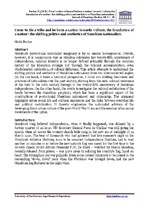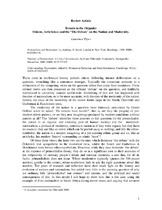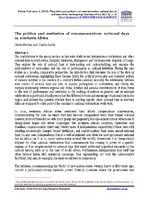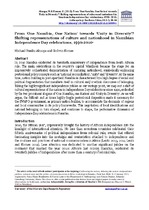From ‘to die a tribe and be born a nation’ towards ‘culture, the foundation of a nation’: the shifting politics and aesthetics of Namibian nationalism
Abstract
Namibia’s postcolonial nationalist imaginary is by no means homogeneous. Overall, however, it is conspicuous that as Namibia celebrates her twenty-fifth anniversary of independence, national identity is no longer defined primarily through the common history of the liberation struggle but through the tolerant accommodation, even wholehearted celebration, of cultural difference. This article attempts to understand the shifting politics and aesthetics of Namibian nationalism from two interconnected angles. On the one hand, it takes a historical perspective; it looks into shifting discourses and practices of nationalism over the past century, starting from the anti- colonial resistance at the turn to the 20th century through to the twenty-fifth anniversary of Namibian independence. On the other hand, the article investigates the cultural redefinition of the bonds between the Namibian people(s), which has been a significant aspect of the constructions of postcolonial Namibian nationhood and citizenship. The argument highlights urban social life and cultural expression and the links between everyday life and political mobilization. It thereby emphasizes the nationalist activism of the developing Black urban culture of the post-World War II era and the internal urban social movements of the 1980s.
Related items
Showing items related by title, author, creator and subject.
-
Return to the organic: Onions, artichokes and 'the debate' on the nation and modernity
Piper, Laurence (Berghahn Books, 2004)There exist in intellectual history periods where, following intense deliberation on a question, something like a consensus emerges. Typically the consensus amounts to a refinement of the competing views on the question ... -
The politics and aesthetics of commemoration: national days in southern Africa
Becker, Heike; Lentz, Carola (Taylor & Francis, 2013)The contributions to the special section in this issue study recent independence celebrations and other national days in South Africa, Namibia, Zimbabwe, Madagascar and the Democratic Republic of Congo. They explore the ... -
From 'One Namibia, One Nation' towards 'Unity in Diversity? Shifting representations of culture and nationhood in Namibian Independence Day celebrations, 1990-2010
Akuupa, Michael; Kornes, Godwin (Taylor & Francis, 2013)In 2010 Namibia celebrated its twentieth anniversary of independence from South African rule. The main celebrations in the country’s capital Windhoek became the stage for an impressively orchestrated demonstration of ...




